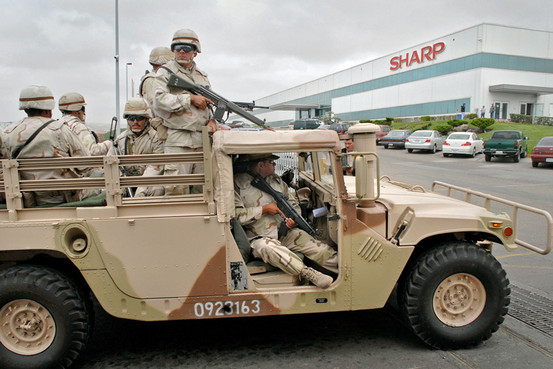Drug Smugglers Target Electronics Companies
It’s becoming more and more common that U.S. Customs agents are finding smuggled drugs in shipments traveling to the U.S. from Mexico. Electronics manufacturers are among the mix of manufacturers who have been targeted by various smuggling and hijacking attempts.
Last month, U.S. Customs agents got a surprise when they checked a trailer of an 18-wheel truck. The truck was crossing into El Paso, Texas from Mexico. It contained more than 9,000 pounds of marijuana that was hidden among auto parts bound for U.S. factories.
Last year, a ton and a half of marijuana entered Sharp Electronics Co.'s television assembly plant in Rosarito, a suburb of Tijuana. The shipment came by means of a Mexican supplier delivering components. Once it arrived, the shipment was transferred to an outbound trailer of widescreen TVs. Thankfully, the drugs were detected before the trailer left the plant.

In addition to smuggled drugs, many manufacturers are also dealing with a wave of truck hijackings. Sony Electronics lost one shipment of 102 large LCD television sets from a Tijuana plant in September. The company thwarted another hijacking attempt in mid-December. Samsung Electronics also lost at least one truckload this year. The company refuses to discuss details of the crime. In the case of many of these hijackings, drivers are often roughed up and the trailer is found empty somewhere days later.
 These hijackings are just two examples of the hijackings that have occurred. So far this year, there have been at least 80 attacks on moving cargo in Mexico. John Baird, general manager for security agency Freightwatch Logistics Mexico, said the increased security that many manufacturers are using to try to protect their employees and their goods are now adding approximately $1 a kilometer (1km = approximately 0.62 miles).
These hijackings are just two examples of the hijackings that have occurred. So far this year, there have been at least 80 attacks on moving cargo in Mexico. John Baird, general manager for security agency Freightwatch Logistics Mexico, said the increased security that many manufacturers are using to try to protect their employees and their goods are now adding approximately $1 a kilometer (1km = approximately 0.62 miles).
For safety, many companies are installing GPS monitors in their trucks, mandating that no trailer leaves a plant unless it's in a caravan of at least ten trucks, and forbidding drivers from stopping anytime between the plant and the U.S. border.
Given the ways in which electronics companies (and many others) have been hurt by the criminal gangs in Mexico, we have to think this will ultimately affect all of us. Prices are sure to go up to make up for the lost goods and increased security costs. In addition, thousands of manufacturers, shippers, and cargo expediters have been certified under a number of U.S. government programs that designate compliance and provide the privilege of fast transit through border checkpoints. It seems logical to conclude that as this problem grows, the policies of our government should also change. If fast transit privileges go by the wayside, it will undoubtedly affect the speediness of electronics shipments arriving at stores.

